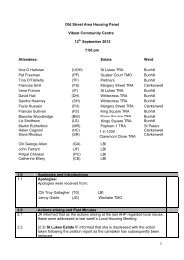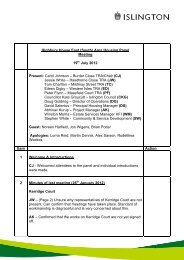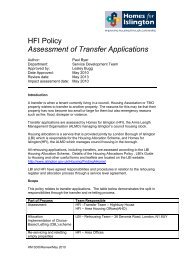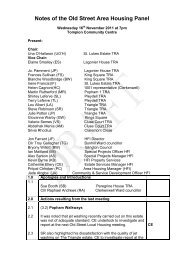Audit Commission report on Homes for Islington
Audit Commission report on Homes for Islington
Audit Commission report on Homes for Islington
You also want an ePaper? Increase the reach of your titles
YUMPU automatically turns print PDFs into web optimized ePapers that Google loves.
L<strong>on</strong>d<strong>on</strong> Borough of Islingt<strong>on</strong> - <strong>Homes</strong> <strong>for</strong> Islingt<strong>on</strong> (ALMO) p 39<br />
248 We found some areas of weakness in that while the Islingt<strong>on</strong> antisocial behaviour<br />
team is a partnership with the council and police, there is <strong>on</strong>ly a draft service<br />
level agreement. There is no systematic m<strong>on</strong>itoring and assessment of the<br />
impact of activities such as diversi<strong>on</strong>ary schemes, and early interventi<strong>on</strong>, to<br />
ensure that the most appropriate acti<strong>on</strong> is taken. Ethnic m<strong>on</strong>itoring of ASB cases<br />
is not c<strong>on</strong>sistently being recorded and so analysis of cases by ethnicity may not<br />
show the full picture to help <strong>for</strong>m future plans. Similarly satisfacti<strong>on</strong> surveys of<br />
complainants of ASB are not carried out, or exit surveys of tenants that leave,<br />
c<strong>on</strong>sequently there is no learning from the experience of residents to in<strong>for</strong>m<br />
future plans. And, current ASB cases cannot be flagged <strong>on</strong> the IT system so HFI<br />
Direct staff taking repairs such as broken windows cannot link these <str<strong>on</strong>g>report</str<strong>on</strong>g>s with<br />
an <strong>on</strong>going case. Housing support officers should provide a service <strong>for</strong> all<br />
residents, however they c<strong>on</strong>sidered that they <strong>on</strong>ly provided support to tenants.<br />
Estate management<br />
249 In our previous inspecti<strong>on</strong>, we found that estate agreements were in place and<br />
tenants had photos of the quality they could expect. Caretakers were more<br />
flexible, had been trained to BICS standard, and had been provided with uni<strong>for</strong>ms<br />
to increase visibility, mobile ph<strong>on</strong>es to improve resp<strong>on</strong>siveness and given better<br />
equipment. Estate inspecti<strong>on</strong>s were undertaken with service users, the council<br />
had obtained funding <strong>for</strong> a pilot scheme to tackle removal of bulk rubbish which<br />
was a persistent problem. The management of parking was improving. However,<br />
tenant satisfacti<strong>on</strong> levels with the service had not improved, c<strong>on</strong>tact numbers and<br />
duties lists were not displayed in c<strong>on</strong>venient places and relati<strong>on</strong>ships between<br />
the area housing offices and TMOs were variable.<br />
250 HFI have maintained a good service and built <strong>on</strong> this by enhancing the role of<br />
caretakers; providing greater support to TMOs; piloting immediate bulk refuse<br />
removal and further improving parking arrangements. Our reality checks showed<br />
that the estates managed by HFI directly met a high standard of cleanliness.<br />
However the standard <strong>on</strong> some estates managed by Hyde Northside did not all<br />
meet the same standard; there is an investment need to improve some<br />
communal paved areas and lighting. The refuse collecti<strong>on</strong> service does not meet<br />
local needs and there is inadequate feedback <strong>on</strong> communal repairs and<br />
improvements. Overall this an improving area of the service but with some<br />
development still required.<br />
251 There is an improved m<strong>on</strong>itoring system <strong>for</strong> estate inspecti<strong>on</strong>s. HFI has<br />
introduced quality c<strong>on</strong>trol inspecti<strong>on</strong>s besides the inspecti<strong>on</strong>s carried out by<br />
officers and residents that cover the upkeep and cleanliness of the estates,<br />
communal repairs and wider issues like crime and nuisance. One of these quality<br />
checks is carried out each m<strong>on</strong>th to inspect the upkeep of estates including<br />
caretaking areas and to score the areas <strong>on</strong> a scale of A (excellent to D (poor).<br />
Any areas identified as scoring D will result in the caretaker being interviewed by<br />
their manager to discuss, identify and resolve issues. Per<strong>for</strong>mance <strong>on</strong> the<br />
standard <strong>for</strong> each locality is <str<strong>on</strong>g>report</str<strong>on</strong>g>ed to area panels of residents and all estates<br />
are <str<strong>on</strong>g>report</str<strong>on</strong>g>ed to a sub-group of the board each m<strong>on</strong>th al<strong>on</strong>g with other<br />
per<strong>for</strong>mance in<strong>for</strong>mati<strong>on</strong>.<br />
252 The role of caretaking staff has been developed and they are now undertaking<br />
minor repair works <strong>on</strong> estates and identifying and removing graffiti and dealing<br />
with other effects of low level antisocial behaviour. And, as menti<strong>on</strong>ed earlier,<br />
there are clear links between caretakers, estate care officers and the ASB<br />
officers and IASBT to <str<strong>on</strong>g>report</str<strong>on</strong>g> and deal effectively with ASB.








